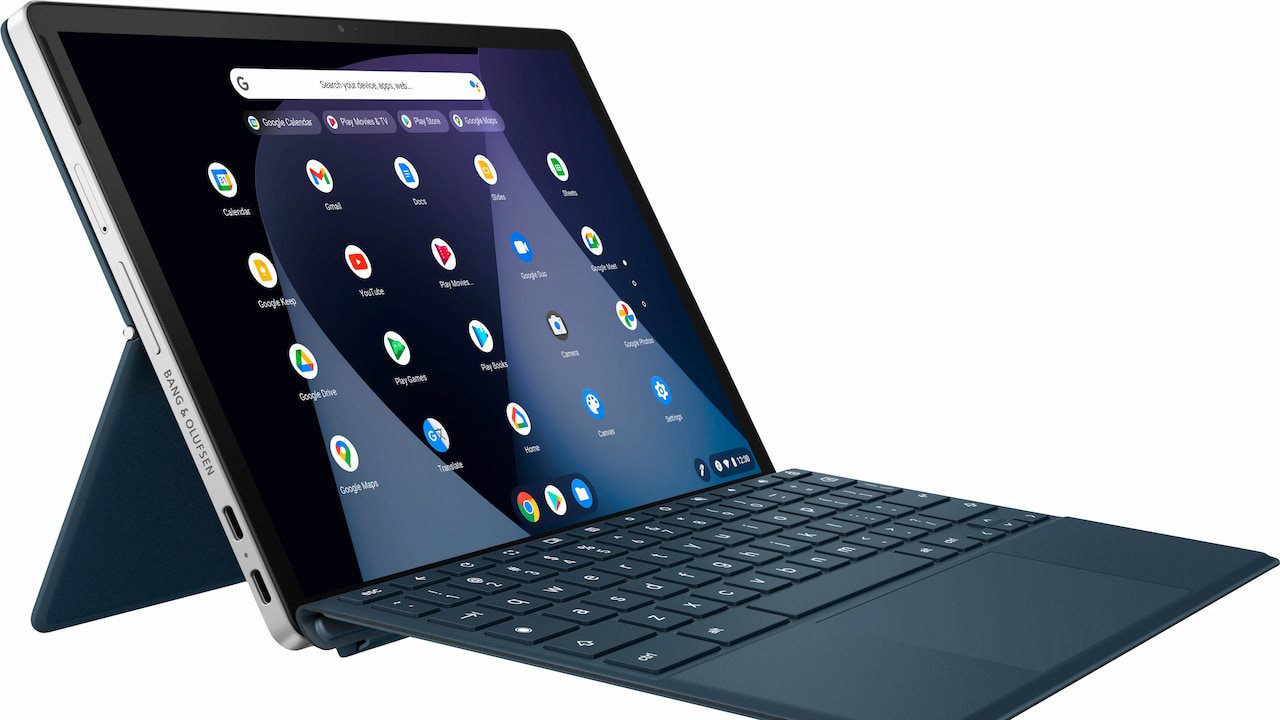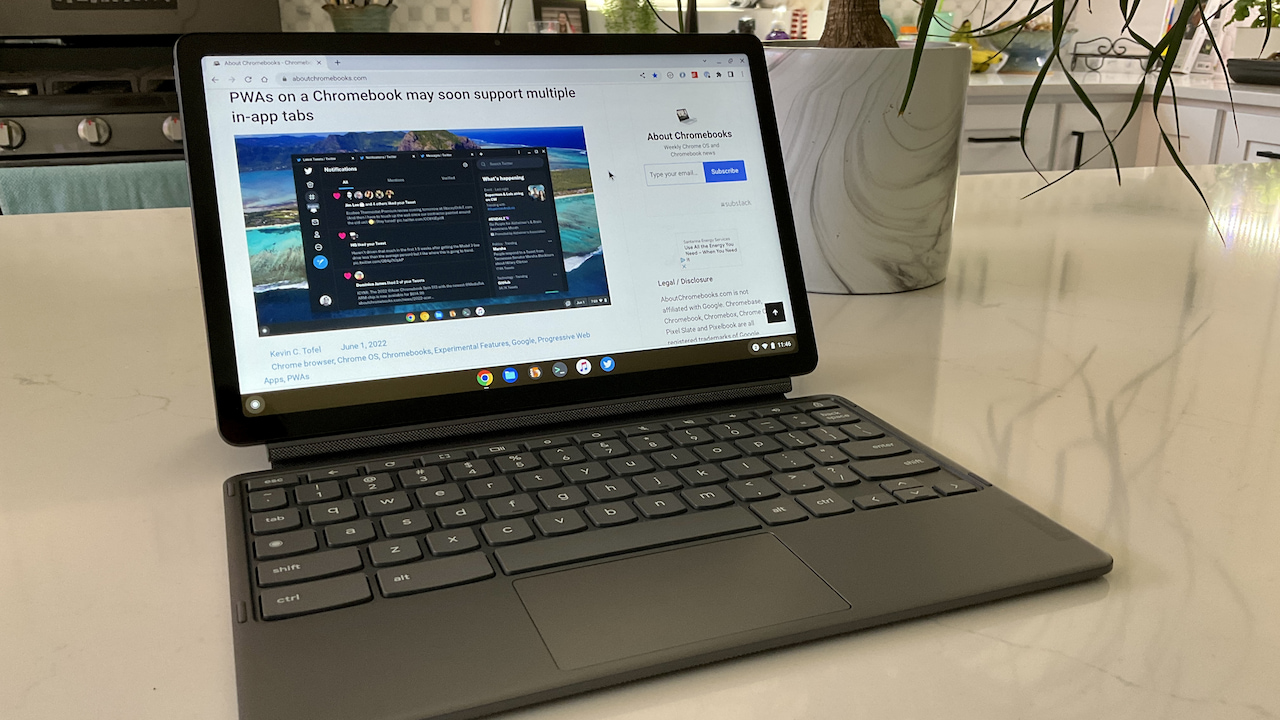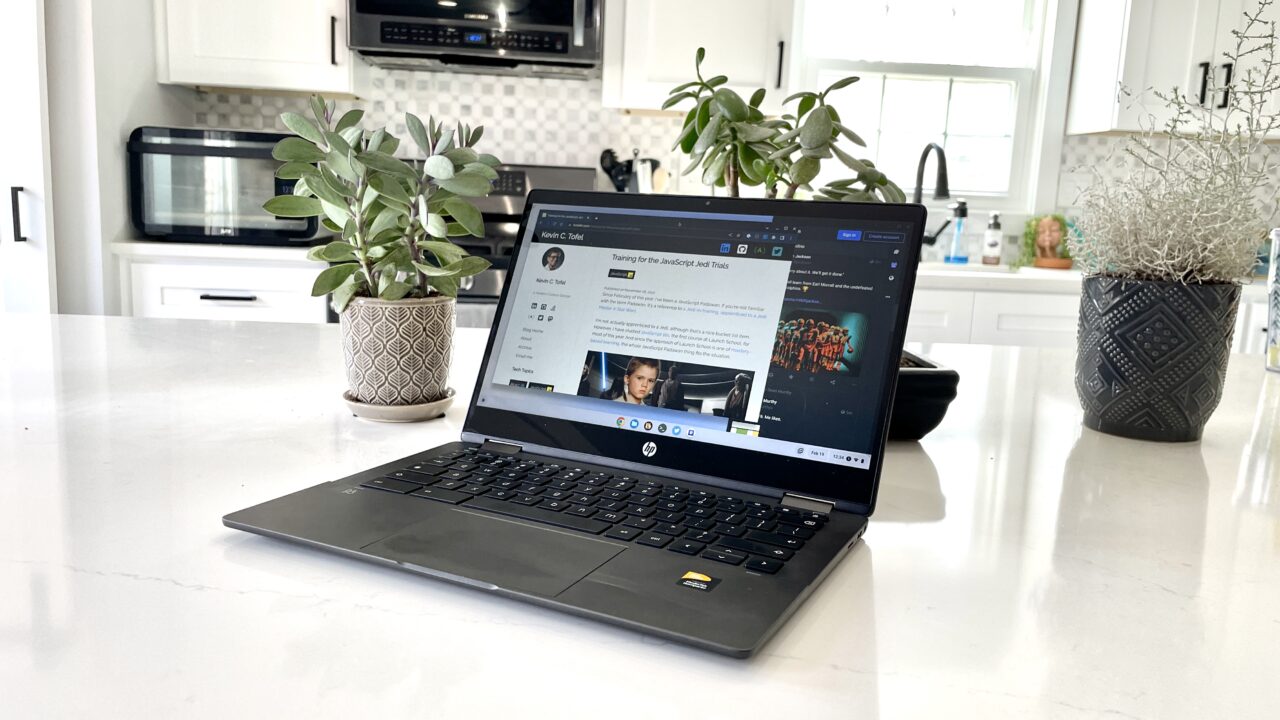Chalk up another missed opportunity for ARM-based Chromebooks. Based on a great find at ChromeUnboxed, it’s clear that there are no Gen 3 Snapdragon 7c Chromebooks coming to market. This is after two successive generations of Snapdragon 7c Chromebooks, which showed some promise with a next-gen chip upgrade.
If you’re not familiar with the previous ChromeOS laptops that used these Qualcomm chips, maybe these names will ring a bell. The HP Chromebook 11 x2 from 2021, for example, was powered by a first-gen Snapdragon 7c. That year also saw an Acer Chromebook Spin 513 model with the same system-on-a-chip or SOC. Battery life on both was above average while general performance was below it.

Enter the Gen 2 Snapdragon 7c in 2022, to be found in another pair of Chromebooks. These device names might sound more familiar to most people. I’m talking about the Lenovo Chromebook Duet 3 and Duet 5 tablets. The battery life was just as good as that of the prior chipset, while performance got an observable boost as well. Priced $300 below the original HP Chromebook 11 x2, the Duet 3 was a close runner-up for Chromebook of the year in 2022.

And yet, there was the promise of Chromebooks with a Gen 3 Snapdragon 7c. Could more gains be made with a more advanced chip process to boost performance without sacrificing great battery life? On paper, yes. At least I thought so when Qualcomm announced the Gen 3 Snapdragon 7c in December 2021. And why wouldn’t I when Qualcomm was touting this:
Purpose-built for users across our Windows PC and Chromebook ecosystem, the 6nm 7c+ Gen 3 delivers an up to 60% faster CPU performance and up to 70% faster GPU performance uplift. The Qualcomm AI Engine enables AI-accelerated experiences through 6.5 TOPS of performance, which is unprecedented in the entry tier. The 7c+ Gen 3 also introduces 5G connectivity for the first time in an entry-level platform, raising the bar of accessible connectivity for affordable device users. The integrated Snapdragon X53 5G Modem-RF system supports 5G sub-6 and mmWave– enabling download speeds of up to 3.7 Gbps. The addition of FastConnect 6700 brings multi-gigabit Wi-Fi 6 and 6E with speeds up to 2.9 Gbps
Alas, this isn’t meant to be.
According to the code commits by Google developers, as found by Chrome Unboxed, every single ChromeOS compute board with a Gen 3 Snapdragon is canceled. We’ll have to look to MediaTek for the next great ARM-based Chromebooks in the near term.
That’s not necessarily a bad thing as the MediaTek Kompanio 1300 chipset appears to be quite capable. Even the Kompanio 1200 in a Chromebook is impressive to me.

I noted this in my review of the HP Chromebook x360 14b last year, saying:
The chipset inside the HP Chromebook x360 14b isn’t going to let you down. No, you’re not getting what I’d call premium performance but you’re not paying a premium price either. And you’re getting a fanless Chromebook with excellent battery life.
Unfortunately, there are more Chromebooks available with older, slower MediaTek chips in them than with these silicon siblings. So there’s definitely room in the market for Gen 3 Snapdragon 7c Chromebooks. Whether it’s Qualcomm, Google, or the hardware makers themselves that don’t want to fill that need, it doesn’t matter. It’s not happening.
I can only assume that the chip costs and/or development were too high, or that Qualcomm simply doesn’t see enough of an opportunity in the market for ARM-based Chromebooks. Maybe it’s both reasons or something else entirely.
The shame of it is this: Unless ARM chips are pushed forward with ChromeOS, there eventually won’t be a market for such devices at all. And I think there still is one.
What Chromebook user doesn’t want adequate performance and long battery life? I know I do, as I ironically just wrote that it’s time for an HP Chromebook 11 x2 successor last month. Oh well…



8 Comments
There aren’t even many Windows laptops with Arm processors right now. ChromeOS should be a much, much better fit for Arm than Windows, But developing a market for Arm on ChromeOS is probably perceived as going “out on a limb” unless and until the Windows market for Arm takes off. Outdated/overstocked Arm chips are a lower risk.
My main interest in Arm would be power consumption specifically when using Android apps on battery power. When I run certain Android apps, my Chromebook’s fan goes on and pretty much stays on.
Well, the main objective of the manufacturers of consumer goods is not to satisfy the consumer but to maximize their profits. To achieve this, they establish long-term strategic alliances that are incomprehensible from our point of view.
They not only intend to make money, but more money than the previous year ????.
“Chalk up another missed opportunity for ARM-based Chromebooks.”
No it isn’t. The actual missed opportunity is the lack of Intel 13th gen N100, N200 and i3-N300 ChromeOS tablets – Windows versions of these have existed for going on a couple of years – as well as the lack of AMD Ryzen 7 7840U and AMD Ryzen 9 7940HS (or AMD Ryzen 9 6900HS or AMD Ryzen 7 6800HS) Chromeboxes for content creation, gaming and programming. For all the hype about Apple Silicon, truth is that despite being 2 process nodes ahead of Intel (10nm vs 5nm) and a process node ahead of AMD (7nm vs 5nm) the M2 Ultra loses to Intel Core i9 and AMD Ryzen 9 in single core performance, and only wins in multicore performance due to having 24 cores. The excellent Serve The Home site states that the Minisforum UM790 with the AMD Ryzen 9 7940HS outperforms the M2 Pro Mac Mini – a device that Serve The Home absolutely loves – and keep in mind that the 7940HS is actually a laptop chip, not a desktop one.
But here is the deal: designing and manufacturing chips costs money. Smartphone chips are (relatively) inexpensive because thanks to Apple, Qualcomm, MediaTek and (sometimes) Samsung making hundreds of millions a year, they benefit from economy of scale. The x86 PC chips from Intel and AMD? Same deal: hundreds of millions a year by Intel, many tens of millions a year by AMD.
But ARM PC chips? Nope. Neither Qualcomm or MediaTek releases figures, but I would be shocked if Qualcomm makes 1 million Snapdragon 8cx and 7c chips a year. The same applies to MediaTek when it comes to their actual “for PC” chips like the MT8192, MT8195 and its variants as opposed to Android tablet chips repurposed for Chromebooks like the MT8183, which was called the Helio P60 and P60T when it was used in Android devices. That is why despite Qualcomm and MediaTek cutting every corner possible – using the ancient Cortex-A76 and a 7nm process as well as a budget Mali GPU and DDR4 RAM for the MT8192 – the chips still cost an arm (bad pun not intended) and a leg. Qualcomm was no better. The Snapdragon 8cx Gen 3 dev kit that Microsoft issued in 2022 cost $600 and Redmond wasn’t even trying to make money off it. A superior in every way Ryzen 5 Mini PC that companies are actually trying to make money off can be had for $450 at MSRP. So yes, this is why HP charged $560 for their x2 11 awhile back, even the version with only 4 GB RAM and 64 GB eMMC. Note: the $529 Steam Deck has 16 GB RAM and a 256 GB SSD. HP isn’t stupid or greedy (even if they do charge $150 more for the x360 14c than they do for similar Wintel devices). It is the cost of the chip.
What about Apple? 3 reasons.
1. Apple was able to charge $999 for a MacBook Air with an Intel Core i3 underclocked to 1.1 GHz, UHD graphics, 8 GB RAM, 128 GB SSD and no touchscreen for years. So it made charging that – and $699 for the M1 Mac Mini that replaced the similarly overpriced Core i3 version – look like a bargain.
2. Apple sells 15-25 million Macs a year. Recycling the M1 and M2 with the iPad Air, iPad Mini and iPad Pro likely gets that up to 50 million a year. That gives them economy of scale, especially when you consider that: 3. Apple is only using 1 core. That’s right: from the M1 in the $999 Air to the M2 Ultra in the $12,000 Mac Pro, it is the same CPU core. Unlike Intel, who ranges from N core/Core i3/Core i5/Core i7/Core i9/Xeon and AMD with Ryzen 3 through Epyc. And the ARM companies – Qualcomm, MediaTek and the rest – juggle designs with a bunch of cores (Cortex-X, Cortex-A7 etc.) to meet price and performance goals even though they technically don’t develop them.
The only way that ChromeOS on ARM was going to succeed was if Google had gone back to their early policy of allowing smartphone chips. At least as late as the Snapdragon 865 in 2019, flagship Android SOCs began to rival Intel Core i3 performance. Google had their reasons – which are another story for another day – but not allowing Chromebook manufacturers to use smartphone chips really set the platform back. Because of it there are fewer OEMs – Samsung has now ditched the platform, which they wouldn’t have if they were able to use it for their Exynos SOCs – and fewer form factor options (virtually no tablets and mini-PCs, no dongles). Here’s the deal: had Google not pulled the plug on ChromeOS with smartphone SOCs right at the same time that they added Android and Linux to the platform then you would have several million such Chromebooks, Chromeboxes etc. selling a year. Then it would have made economic sense for Samsung, MediaTek and Qualcomm to design PC-specific SOCs. But doing it backwards? Doesn’t work.
Note: Apple did not design the SOC used in the original iPhone. Apple and Samsung modified an existing SOC that Samsung was using for cable boxes. It was only after the iPhone started generating big money – and they introduced the iPad – that Apple went with their own designs.
This is a big dissapointment, but we have seen this coming. There has not been one single 7+ Gen 3 Device, even for Windows. It was a paper launch.
Qualcomm has no interest in providing quality and affordable chips for neither Windows Laptops nor Chromebooks. They are for the Ultra-Premium, but none of it current chips can compete with the Intel, AMD, and Apple Bleeding Edge, so probably will stay this way till they release their Oryon-based chip.
On the other hand, it seems that Mediatek is not that interested in the Chromebook market either. Even the Kompanio 1200/1300 is already 1-2 years old, prices have gone as down as it should be.
Indeed, Intel is bringing soon some N200 laptops that have much more competent processors than any ARM Chromebook has, while remaining cheap, and providing good battery life.
It seems to me that Intel is providing much better support from Chromebooks than any other chip-maker, and Google is recompensating that partnership.
Bad for the consumers, because we are being left with less and less options. There’s a drought of quality Chromebooks as recently.
Chromebooks in development (Herobrine, Hades, and Agah) with Nvidia discrete GPU were also cancelled last month. I think this has not been reported yet, might be interesting to dive into this.
https://chromium-review.googlesource.com/c/chromiumos/platform/ec/+/4727767
Hi Kevin:
Now THIS is what needs to be in Chromebooks: https://www.tomshardware.com/news/intel-demos-meteor-lake-cpu-with-on-package-lpddr5x
It isn’t the unified memory that Apple uses on their M2 and other Mac chips but it is the next best thing: taking a Samsung DRAM module and making it a chiplet (though Intel calls it a tile) and gives 120 GB/s instead of the typical 40-50 GB/s. When you consider that Intel is also going to use the tile approach to turn their current Arc A370M discrete GPU – which performs 80%-90% of the NVIDIA GeForce GTX 1650 Ti – into an integrated GPU, this would be the ideal chip for a Chromebook Plus device for 2024.
I know that PC fans prefer upgradeable memory but IMHO Chromebooks aren’t meant to compete with PCs. They are supposed to be appliances, where you sacrifice flexibility in return for simplicity and security. I actually rather agree with Google pulling the plug on discrete GPUs for the same reason. With the RAM and GPU integrated that could mean very thin devices – tablets even – very capable at Steam gaming, Python programming and video editing that are a lot simpler and safer to use than their Windows counterparts while still being hundreds of dollars cheaper than a MacBook Air (and possibly even cost about the same as an iPad Air).
This is promising although I personally prefer the ability to upgrade memory in any of my computers if given the choice. I used to say that Chromebooks were appliances too. I feel less so these days with the additional capabilities offered by Android apps and the Linux desktop software support. So for me (and I realize I’m an edge case) Chromebooks are less of an appliance. I also don’t care as much as most people about having a thin ChromeOS device unless we’re specifically talking about tablets. Still, I know that I’m not a good representation of the market and I think many ChromeOS users will be happy if Meteor Lake delivers on its promises and becomes readily available in devices.
As someone who doesn’t use Android apps on ChromeOS, I am not representative of the market either 🙂
But I understand your position. However the “just turn it on and use it” crowd does exist and it is not an insubstantial one. Right now the ones among that crowd who need superior computing and graphics performance mostly use Macs and iPads. Well, versions of the Asus Chromebox 6 and Asus Chromebox CXI5 that release in 2024 should have the same general performance capabilities as this guy – https://store.minisforum.com/products/minisforum-hn2673 – but in a decidedly smaller and cheaper package. (I say “should” because Chromebooks and especially Chromeboxes often get chips a year late. In fact, we never got Tiger Lake Chromeboxes at all due to the chip shortage.) That will give the “it just works” crowd another option. And it will be the option that allows you to play Street Fighter 6 and Red Dead Redemption II, which you can’t on a MacBook or iPad.